International Justice Initiative
About us
The International Justice Initiative enables students to experience the practice of international law and policy first-hand, through legal research, analysis and service in the public interest.
It empowers a group of University of Tasmania law students to tackle diverse issues of justice in the international arena, by contributing to the work of influential organisations and alumni on contemporary issues of international law.
The Initiative has four main objectives:
- Advancing the practice of international law in the public interest
- Providing students with opportunities in international law and policy
- Supporting poor and vulnerable countries and groups with pro-bono advice
- Further strengthening the University of Tasmania Law School's international profile
Student achievements have included supporting poor and vulnerable countries at United Nations meetings, contributing to new international initiatives, and press coverage by major international media.
The Initiative is student-led, and builds on a background of successful participation by University of Tasmania students and alumni in international processes, and ongoing engagement with faculty and alumni.
Students are invited to apply to participate at the start of each academic year.
Opportunities
The International Justice Initiative aims to provide opportunities for students with a strong social-justice and public-interest orientation to engage in the substance and practice of international law.
Participating students have the opportunity to:
- Undertake research to advance international law in the public interest and provide pro-bono support
- Assist alumni and other experts working in international and public-interest-focused organisations
- Cooperate to complete research projects under the careful supervision of faculty and/or external advisors
- Learn about international law-making through ad-hoc seminars by experts in UN and other international processes
- Receive support in finding and undertaking internship and work experience opportunities with a global reach
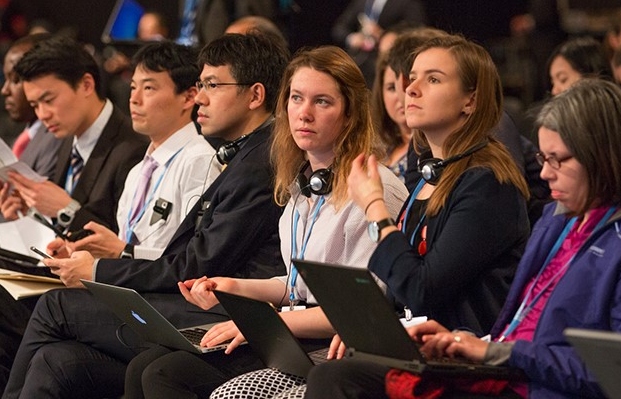
The Initiative has also provided a number of opportunities for students to travel abroad and participate in international processes.
Current work
The Initiative has conducted work in international climate change law, sending a few students to UN Climate Change conferences every year. More recently, the Initiative has also assisted the recipient of the Tim Hawkins Scholarship from the University of Tasmania (who acts as the Legal Assistant to the Special Advisor on international humanitarian law to the Prosecutor of the International Criminal Court in the Hague) in international humanitarian law, and worked with the Convention against Torture Initiative on anti-torture legislation.
Future work
Building on experiences with international climate change law, human rights law and international humanitarian law, opportunities are being explored in areas such as international refugee law, trade law, and fisheries law, in consultation with University of Tasmania faculty and alumni and their networks.
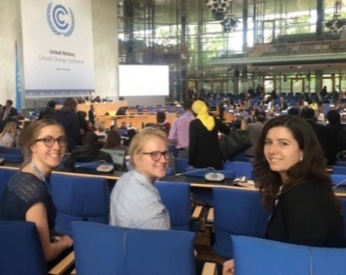

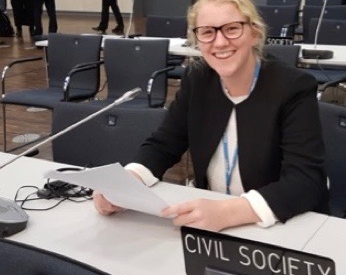
Achievements
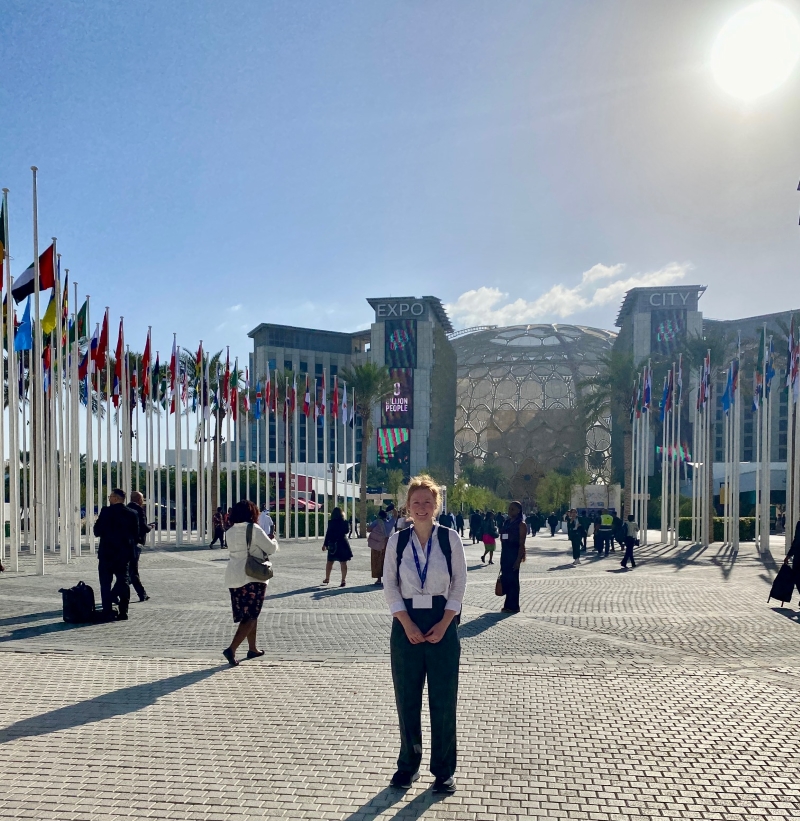
Highlights
Students involved in the International Justice Initiative have made significant contributions to the development of international law and policy in a range of fields. These include:
- Participating in multiple United Nations meetings and providing assistance to negotiating groups representing over 60 countries, including advice throughout the development of the ‘rulebook’ of the Paris Agreement on climate change.
- Researching the financial needs of developing countries to achieve their pledges under the Paris Agreement, which gained international media attention during its signing ceremony in New York.
- Supporting multiple initiatives serving the world’s poorest countries, including on renewable energy and climate change adaptation.
- Conducting research into the position of countries and organisations on public participation and conflicts of interest at climate change negotiations.
- Preparing memos of advice for the Tim Hawkins Scholar from the University of Tasmania (who acts as the Legal Assistant to the Special Advisor on international humanitarian law to the Prosecutor of the International Criminal Court in the Hague) on the interpretation of the Rome Statute.
- Building connections between the University of Tasmania and overseas universities, further strengthening the Law School’s international profile.
Tasks undertaken by the International Justice Initiative in 2023 include:
- Assisting with legal research into supporting the position that it is legal under international law to provide cross-border humanitarian assistance to civilians in areas controlled by non-state armed groups - with a specific focus on providing humanitarian aid to north-west Syria.
- Preparing a comparative law research document of global legislation to see which countries have a version of Future Generations legislation and framework in place, informing the group to make recommendations of a legal framework that might suit a Tasmanian and Australian context.
- Assisting with legal research into whether the return of Syrian refugees back to Syria from Lebanon and Türkiye breaches the international law principle of non-refoulement.
- Assisting the Fossil Fuel Non-Proliferation Treaty Initiative with research into how other treaty instruments created new financial obligations for States and unpacking the pros and cons of different treaty financial mechanisms.
Event
The International Justice Initiative and the Student Environment and Animal Law Society co-facilitated a workshop event on the Conference of Parties and the United Nations Framework Convention on Climate Change in September. The event was hosted by a Convenor of the Initiative, Matthew Stilwell, who explained how the conference and treaties work, how students can engage physically or remotely with the conference and unpacked some important positions to be pushed at the conference such as ensuring a just transition to renewable energies and centring policies and negotiation discussions around the concept of climate justice, establishing a Fossil Fuel Non-Proliferation Treaty, and keeping fossil fuel language out of negotiation texts.
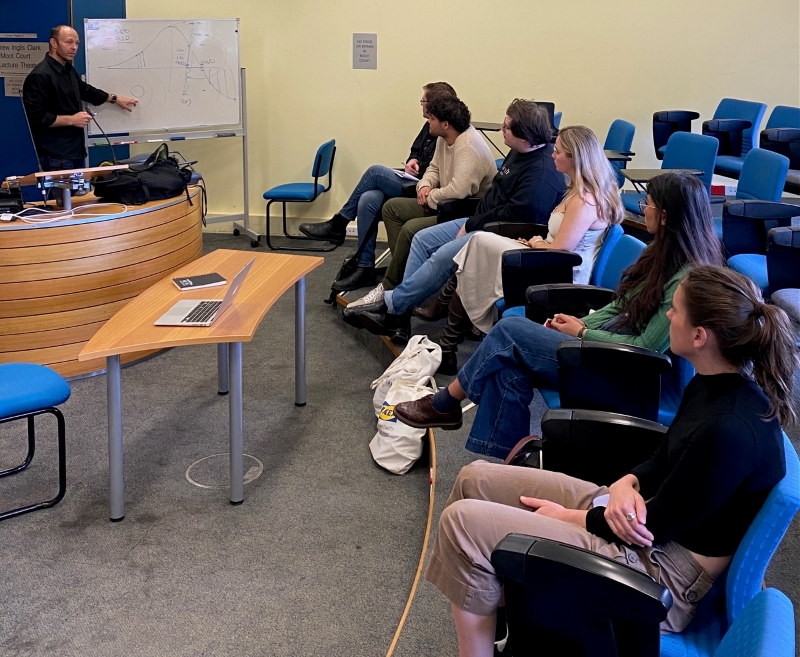
COP28
In December 2023, one of the Initiative’s student Co-coordinators, Mia Partridge, had the opportunity to attend the 28th annual UNFCCC Conference of Parties in Dubai. Mia assisted Convenor Rebecca Byrnes with her work with the Fossil Fuel Non-Proliferation Treaty by doing administrative tasks related to the organisation of events and tracking negotiations in areas such as the just transition work programme and the global stocktake. Mia also met with Convenor Matthew Stilwell there to discuss his work, and with UTas Law School alumni and past students participants of the International Justice Initiative, Heidi White and Camilla Moore to discuss their work. Mia also met and networked with a wide range of interesting and inspirational advocates, activists, academics, scientists, politicians and civil society members from all over the world.

Tasks undertaken by the International Justice Initiative in 2022 include:
- Assisting with research into the recognition of people with disabilities and their differing needs in the context of humanitarian law and under State’s Military Manuals.
- Researching, collecting and analysing data related to whether fossil fuels, renewable energy, and a just transition are mentioned in African countries’ Nationally Determined Contributions.
- Expansion of the aforementioned task, to collecting and analysing data from all global Nationally Determined Contributions as to whether fossil fuels, renewable energy, and a just transition are mentioned. The findings were then synthesised into a report.
- Preparing a research and recommendations memo into lessons that can be learned from the missing persons mechanisms in Lebanon in respect to establishing an international missing persons mechanism in Syria.
Tasks undertaken by the International Justice Initiative in 2020 include:
- Assisting the Fossil Fuel Treaty Initiative in researching and preparing a memo on why a fossil fuel registry might be useful in a Fossil Fuel Non-Proliferation Treaty, and how this might operate.
- Assisting Matias Thomsen in preparing a memo on whether non-state armed groups incur obligations of an occupying power when controlling territory.
- Assisting the Loss & Damage Youth Coalition, a group of youth from the global North and South who are demanding action on the Loss and Damage caused by climate change, in their initial set-up phase.
- Assisting the Fossil Fuel Treaty Initiative in determining the fundamental ingredients of a Fossil Fuel Treaty, by researching and presenting the major treaties that prohibit the use of weapons and harmful substances.
- Researching information on Total SE’s actions and narrative, as well as current watch sites, in order to create the building blocks for a website which will criticise the practises of Total SE, a French company which operates in many countries to create, supply and dispute oil, natural gas and electricity.
See the 2020 Coordinators’ Report (PDF 139.5 KB) to UTAS Staff and Students
Participants: Rachel Hay (coordinator), Nina Hamasaki (coordinator), India Beecroft, Felix Craig, Aisha Nazzal, Himaushu Hardikar, Andonny Papastamatis, Sharifah Syed Rohan and Kavindya Walalawela Gedara.
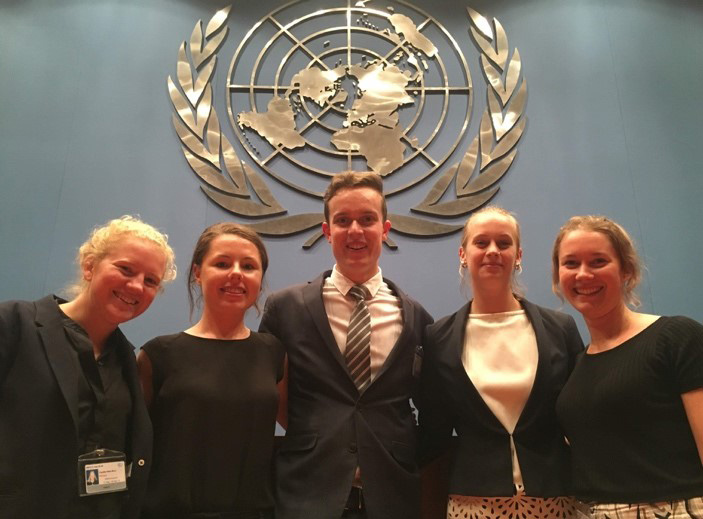
Tasks undertaken by the International Justice Initiative in 2019 include;
- Participants co-created the Climate Justice Syllabus website with students from the College of the Atlantic, Maine (USA) by developing outlines on various topics including carbon markets; energy; equity; finance & debt; human rights; climate justice history and background; corporations; migration and movement; hope; and water.
- Participants assisted Matias Thomsen in drafting a legal brief concerning legal aspects of issues arising from the detention of ISIS foreign fighters by the Syrian Defence Force for Diakonia’s IHL Resource Desk in Lebanon, a Swedish NGO engaged in local capacity building work in International Humanitarian Law.
- Participants drafted a brief about the legal protections which medical objects (like hospitals, ambulances and medical equipment) have in occupied territory for Professor Tim McCormack, Special Advisor on International Humanitarian Law to the Prosecutor of the International Criminal Court.
- Participants drafted a legal brief in preparation for the review of the Warsaw International Mechanism for Loss and Damage (WIM) at COP25 in Madrid, Spain, considering the governance of the WIM.
- Participants assisted the Convention Against Torture Initiative during a weeklong conference of Pacific Island states which was aimed at securing ratifications of an anti-torture protocol from those states.
- Participants attended the 25th Conference of the Parties of the UN Framework Convention on Climate Change in Madrid to support civil society advocates on key issues such as loss & damage and carbon trading & offsetting.2019
Participants: Felix Craig, India Beecroft, Kate Raffety (coordinator), Matthew Etherington, Molly Bird, Nina Hamasaki, Rachel Hay, Salman Shah (coordinator).
See the 2019 Coordinators’ Report (PDF 164.2 KB) and COP Participants’ Report (PDF 96.5 KB) to UTAS staff.
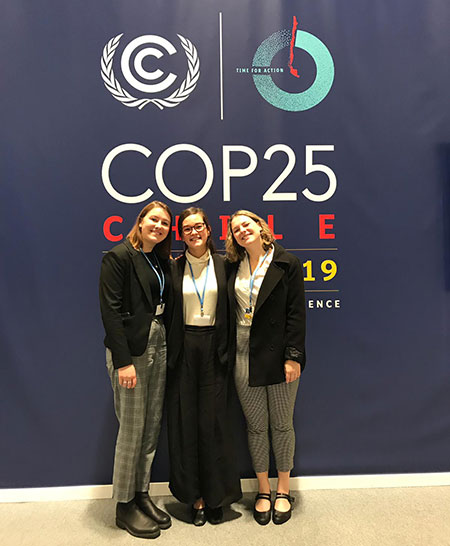
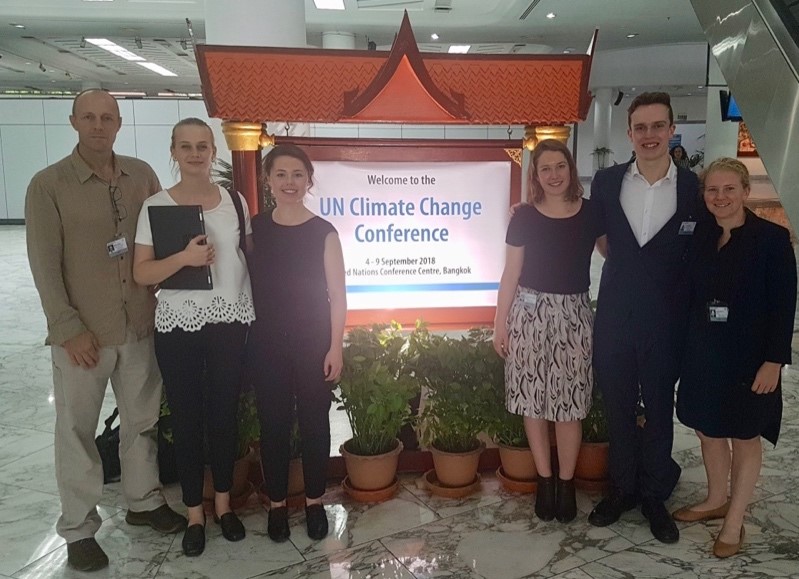
Tasks undertaken by the International Justice Initiative in 2018 include:
- Attending the UN Climate Change Conference in Bangkok, Thailand and providing advice to support developing countries in negotiations on the rulebook for the Paris Agreement, including on the global stocktake, technology transfer, market mechanisms and loss & damage. Students also delivered interventions to the full UN plenary on behalf of civil society.
- Preparing a memo of advice for the Tim Hawkins Scholar from UTAS (who acts as the Legal Assistant to the Special Advisor on international humanitarian law to the Prosecutor of the International Criminal Court in the Hague) on the interpretation of provisions of the Rome Statute which provide protections for cultural property.
- Preparing a memo on the legality of torture provisions in Asia-Pacific countries for the Convention Against Torture Initiative. Students also attended and helped organise a seminar in Fiji in February 2019 which aimed to assist ratification and implementation of the United Nations Convention Against Torture in the Pacific.
- Analysing the adaptation needs of 54 African countries and assist in the development of a online portal for the African Adaptation Initiative and the United Nations Development Programme.
- Researching the positions of UNFCCC parties and organisations on conflicts of interest to support developing countries and civil society calling for a policy on conflicts of interest.
- Researching climate change loss & damage finance in Africa in collaboration with experts to support the review of the Warsaw International Mechanism.
- Updating research by IJI on the financial needs of developing countries to achieve their pledges under the Paris Agreement to provide context for negotiations on climate finance at COP24.
See the 2018 Presentation to UTAS staff and IJI Year in Review story by Law Reporter, Rachel Hay.
Participants: Alice van Galen (coordinator), Connie Beswick, Dan Westbury, Frances Medlock (coordinator), Heidi White, Kate Raffety, Rosie Evans, Salman Shah

Tasks undertaken by the International Justice Initiative in 2017 include:
- Attending UN Climate Change Conference in Bonn, Germany in May 2017 and providing advice to support developing countries and civil society in negotiations on the rulebook for the Paris Agreement, including on transparency, compliance and the global stocktake (See May 2017 Report - PDF).
- Attending UN Climate Change Conference in Bonn, Germany in November 2017 and providing support to the Least Developed Countries (LDC) Group.
- Preparing a memo of advice for the Tim Hawkins Scholar from UTAS (who acts as the Legal Assistant to the Special Advisor on international humanitarian law to the Prosecutor of the International Criminal Court in the Hague) on the interpretation of provisions of the Rome Statute which provide protections for cultural property.
- Conducting research into the position of various organisations on public participation and conflicts of interest at the UNFCCC, to contribute to an international workshop on this topic, which was covered by the New York Times and other media outlets.
- Analysing the Nationally Determined Contributions of African countries to assist the African Adaptation Initiative.
- Analysing the Nationally Determined Contributions of the LDCs to assist the LDC Renewable Energy and Energy Efficiency Initiative for Sustainable Development.
- Acting as rapporteurs for a climate justice conference - Imagining a Different Future - at UTAS and producing a comprehensive conference report with summaries of every session.
Participants: Alice van Galen, Ashleigh McCoach, Brook Dambacher (coordinator), Camilla More, Frances Medlock, Gabby McDonald, Heidi White, Kate Raffety, Lauren Hargrave
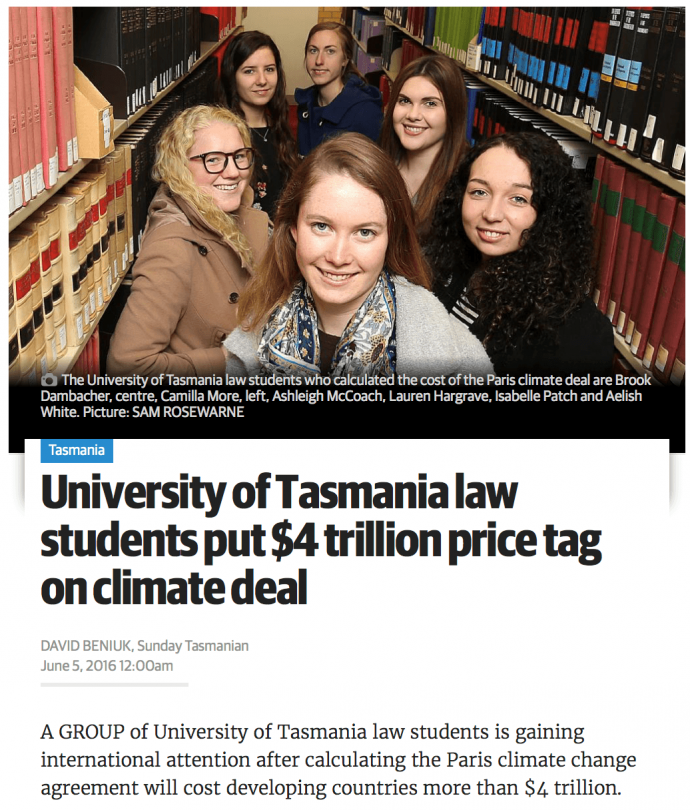
Tasks undertaken by the International Justice Initiative in 2016 include:
- Researching the financial needs of developing countries to achieve their pledges under the Paris Agreement on climate change, which gained international media attention during its signing ceremony in New York.
- Mapping initiatives on renewable energy and energy efficiency serving the Least Developed Countries (LDCs), to inform the development of the LDC Renewable Energy and Energy Efficiency Initiative for Sustainable Development.
- Analysing mandates flowing from the Paris Agreement to support the development of a workplan for the LDCs.
Participants: Aelish White, Ashleigh McCoach, Brook Dambacher (coordinator), Camilla More, Isabelle Patch, Lauren Hargrave
Background
The Initiative was founded in 2016, following the experience of two UTAS students travelling to the UN Climate Change Conference in Paris during December 2015.
The students had conducted research into the negotiations process throughout the year under the guidance of University of Tasmania alumnus Matthew Stilwell – a public interest lawyer and legal advisor to developing countries in the negotiations – and were able to make valuable contributions in the lead up to, and during, the conference.
The Initiative is the result of efforts to bring similar opportunities to engage in international law processes to UTAS law students, to help cultivate the next generation of public interest international lawyers.

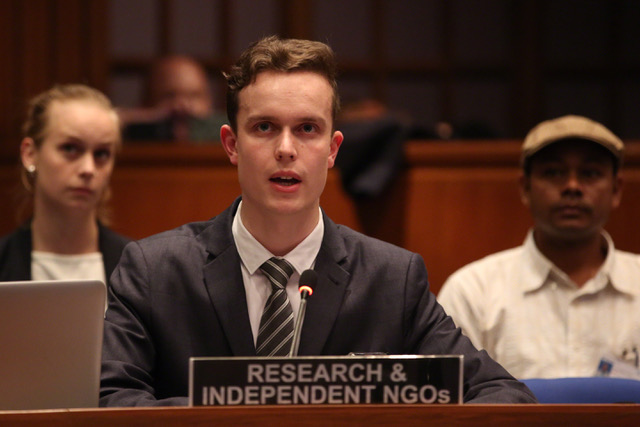

People
People supporting the Initiative include:
Co-founders/Convenors
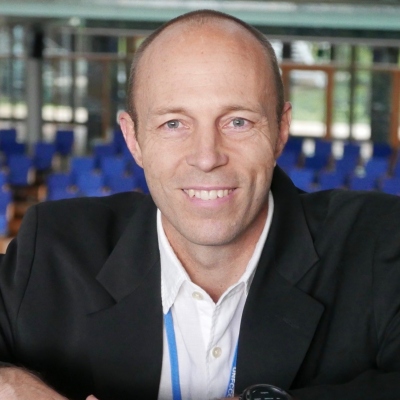
Matthew Stilwell is a Faculty of Law Alumni and public interest lawyer who has counselled governments, international- and non-governmental organizations in multilateral negotiations on trade, climate, energy and sustainable development.

Rebecca Byrnes graduated from the University of Tasmania in 2014 before undertaking masters programs in Oxford in law and environmental change and management as a Rhodes Scholar. Rebecca has supported poor and vulnerable countries in the international climate negotiations and currently works as a Policy Analyst at the London School of Economics at the Grantham Research Institute on Climate Change and the Environment.

Brook Dambacher graduated from the University of Tasmania in 2017 and is currently undertaking a master’s course in environmental change and management and public policy at the University of Oxford as a Rhodes Scholar. She works to support developing countries in the United Nations climate change negotiations as well as on sustainable development initiatives, particularly in the area of renewable energy..
Faculty Advisors

Rick Snell is an Honourary Associate Professor in law at the University of Tasmania. He played a key role in catalysing and supporting the Initiative.

Matias Thomsen is a Lecturer at the University of Tasmania. His postgraduate research was on the role International Criminal Court judges can play in the progressive development of international humanitarian law. He has an on-going relationship as a research assistant with the International Criminal Court.
Apply
The Initiative seeks applications from current University of Tasmania law students at the beginning of each year. Positions are limited and are awarded through a competitive, merit-based selection process.
Time commitment
Participants are expected to dedicate an average of 3 hours per week, with the possibility for more or less time depending on the research projects that are being undertaken and student's university assessment commitments.

Application process
Students will be notified about the application process on an annual basis. Applications for new student participantswill require:
- A cover letter setting out your motivation to work in the area of public interest international law and why a commitment to the public interest is important in matters of international relations and law, as well as your teamwork ability, and problem solving/strategic thinking skills.
- A curriculum vitae.
Applications for students reapplying to the Initiative will require:
- A cover letter setting out your motivation to continue working on the Initiative, reflections on your experience with the Initiative to date and, if applicable, an expression of interest in the student coordinator roles.
Applications should be sent to iji.utas@gmail.com with the subject title "International Justice Initiative: Expression of Interest".

Application deadline
Based on the above, applications close at the end of semester 2 each year. The specific date and time, and any additional information on the application process will be provided in the call for applications.
For more information, please contact us at iji.utas@gmail.com
